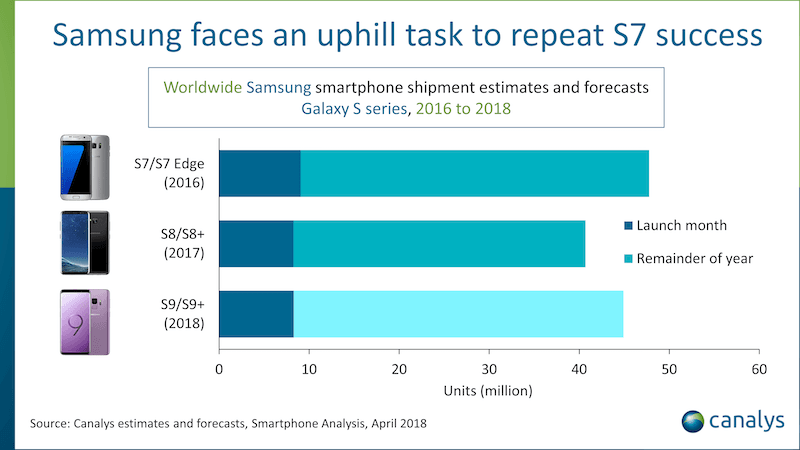Samsung, the South Korean smartphone company which lost the battle to Xiaomi in the Indian market, is now said to ship just over 8 million units of the Galaxy S9 and the Galaxy S9+ in the first four weeks after launch. These numbers are in-line with those of the Galaxy S8 and S8+ in April 2017 but failed to surpass the 9 million shipments achieved by the Galaxy S7 series in March 2016. Research firm Canalys also stated that a much greater percentage of shipments were of the S9+ model when compared with the S9, largely due to the distinct dual cameras of the S9+ that are lacking on the cheaper S9. Out of the 8 million shipments for the S9 duo across the globe, 2.8 million were shipped to the US, and close to 1 million were shipped to its home country of Korea.

“Samsung’s performance is impressive, considering the Galaxy S9 is not a major step up from the S8,” said Canalys Analyst Ben Stanton. “Samsung has made significant improvements to its go-to-market strategy, with wider availability of the S9 in more markets at launch. It has also engineered upgrades by providing an aggressive global device trade-in program, with generous discounts to reduce costs to end users. Its regional teams are being rated on volume, with management eager for the S9 to out-ship the S8. With some regional teams already electing to discount the Galaxy S9, it is clear that as the worldwide market slows, Samsung will sacrifice margin to defend its share," he added.
If you look at the last two year's flagship models from Samsung, the Galaxy S7 & S7 Edge remains the Samsung's best-selling Galaxy smartphones ever with the shipments crossing 48 million in the launch year. Samsung managed to ship 41 million Galaxy S8 and S8+ devices last year even though they both packed incredible tech.
However, the demand for the Galaxy S9 duo is decreasing with every passing day and with newer flagship models coming out from the Chinese brands. Samsung has a mixed reception for the Galaxy S9 devices, but Samsung's competitor Apple had a disappointing quarter for the premium Apple iPhone X. As per Canalys estimates, Apple shipped less than 14 million iPhone X units in the first quarter of 2018, which is less than double shipments Apple achieved in the last quarter of 2017. In Q4 2017, Apple managed to ship over 29 million iPhone Xs.
“Apple’s iPhone X performance in Q1 is a clear indication of the challenges that premium smartphones now face,” said TuanAnh Nguyen, Analyst at Canalys. “The novelty of premium smartphones is wearing off, and features such as 18:9 displays and dual cameras are being commoditized quickly to lower ASPs. While Samsung has tackled the issue of slowing demand for premium smartphones head-on by announcing trade-in programs and partner-driven offers, new smartphones from Huawei and Google’s Pixel smartphones are primed to dent its sales quicker than Samsung can anticipate.”
Samsung is now working on its Galaxy Note 9 smartphone, which will replace the Galaxy Note 8. With the depleting sales for the S9 duo, Samsung is rumoured to launch the Note 9 much ahead of the schedule, possibly in June 2018 itself. The Note 9 already paid a visit to various benchmark portals, meaning Samsung already finalised the design and the testing samples are already out.















